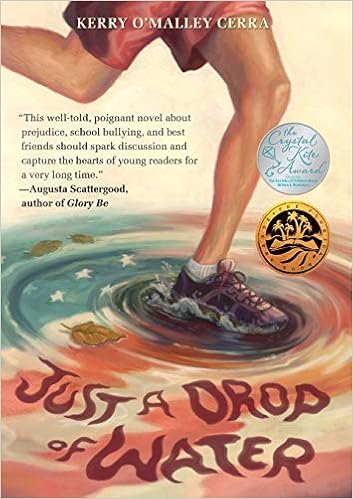My first year of teaching was in 2001. I was a two-week-old teacher when terrorists hit the World Trade Center.
That day stands out as a "Do you remember where you were?" moment for me and many people. But for our students, September 11th, 2001 is history. So how do we make it real for them?Introduce good books
Then, unexpectedly, school is shut down and he's sent home. On the way home, he rescues a mangy, stray dog, Radar, faces the challenges of bullies, plays with (and loses) his little sister, and promises his mom that he won't turn on the TV.
The story is told in alternate chapters - Alex's point of view and that of the "man in the white shirt." I thought I had it figured out. I was in tears when I got to the end of the book.
A gentle book that gives students a sense of the disconnect that occurred on a day when the world fell apart and no one knew quite what to do.
A beautifully woven story of four middle school-aged kids who don't know each other, but whose lives weave together in the two days leading up to September 11th. Will is struggling with the death of his father, a truck driver who told him never to do anything stupid on the highway - and then did just that thing.
Naheed is Muslim and in her new school, she gets funny looks and questions because she is wearing a headscarf.
Aimee has just moved to California and her mom has to leave for a business trip to New York, missing her first day of school. For the first time.
Sergio, raised by his grandmother because his father is never around. Except when Sergio makes the news.
Naheed is Muslim and in her new school, she gets funny looks and questions because she is wearing a headscarf.
Aimee has just moved to California and her mom has to leave for a business trip to New York, missing her first day of school. For the first time.
Sergio, raised by his grandmother because his father is never around. Except when Sergio makes the news.
Deja lives in the homeless shelter near a great school and comes with her guard up so she doesn't have to share her life with her classmates. The students turn out to be pretty chill, and her teacher starts them on a massive project to look back on September 11th.
In asking and answering questions, Deja begins to learn about her family: why her father gets inexplicably angry, why he can't hold down a job anymore, and how she and her friends were impacted by an event that happened many years before.

Jake and Sam are cross-country runners in Florida who've been best friends for years. Kirk is a new addition to their friend group, whose father works in Washington, D.C. When September 11th happens, attitudes and emotions run high. Someone beats Sam up for being Muslim. Jake's mom questions their friendship and Sam's parents, especially after Sam's father is questioned by the FBI.
Jake starts to second-guess everything he believed to be true about Sam. He even second-guesses his own grandfather, whom he revered. It turns out that not everything is as it seems. This book is great for discussions about how quickly we rush to judge people who don't look and act like us. It's also a powerful book about faith and hope, friendship, and the power of forgiveness.
Engage them in learning
- Develop interview questions as a class and then have students interview someone about where they were that day and what they remember. Put these recollections together in a book, poster, or video.
- Work with them on one of the lessons from the September 11th memorial. They have many outstanding choices leveled by grade.
- PBS has lessons, also leveled by grades, including ones to help students with misperceptions about who their Arab-American neighbors are.
- Scholastic has plans and discussion guides, leveled by age group.
- Newsela is a great source for nonfiction articles written for lower or upper elementary, middle, and high school students. Some are paired with other texts; each comes with a general writing prompt and a 4-question quiz.





No comments
Post a Comment